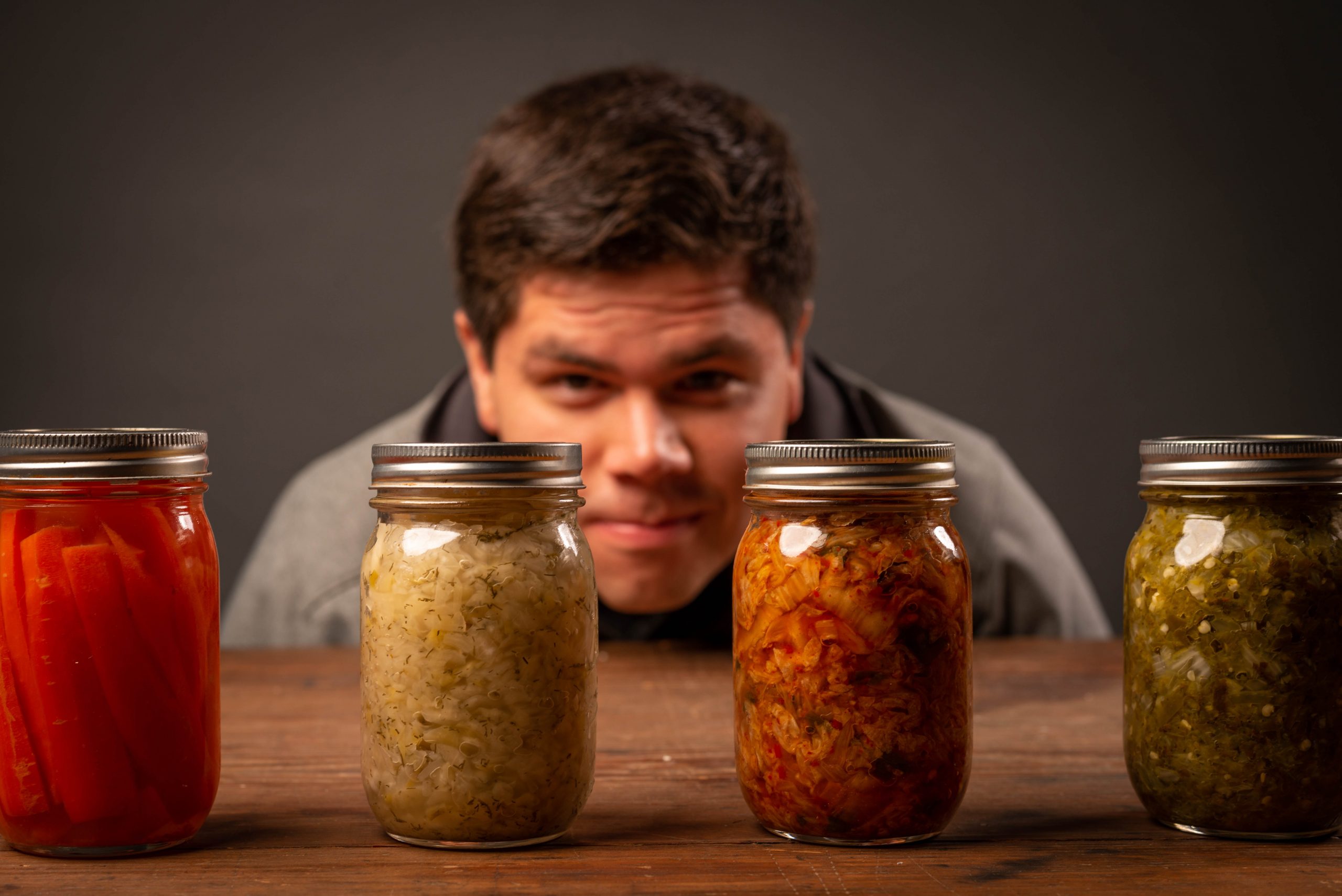The balance and diversity inside your gut affects more than you think!
We need to allow our gut to celebrate diversity too! Our happiness depends on it.
Several experimental methods have shown how antibiotic treatment, germ-free animal models and low diversity of faecal microbiota can negatively affect central nervous system function leading to symptoms of depression, anxiety and poor sleep. [1]
Further, a growing body of evidence has shown that consumption of probiotics can improve symptoms associated with mood and anxiety disorders through activity of the gut-brain axis. [2]
What is the Gut-Brain Axis?
The Gut-Brain Axis is a complex communication system between the Central Nervous System and the Gastrointestinal Tract through various pathways involving neural, endocrine and immune cells.
It is bidirectional, not only does the brain talk to or influence the gut, but also the other way around.
When we think of neurons, we think of the brain. The brain has 100 billion neurons. The gut, or more specifically the enteric nervous system also has a surprising 500 million neurons.
It is sometimes referred to as the second brain.
These gut neurons are connected to your brain through nerves in your nervous system. These are like the communication pathways.
One of the biggest pathways connecting your gut and your brain is the Vagus Nerve. When we experience stress, the vagus nerve’s ability to transmit neurons is reduced and it can cause gastrointestinal issues.
An interesting study in mice found that feeding them a probiotic reduced the amount of stress hormone in their blood. However, when their vagus nerve was cut, the probiotic had no effect. This suggests that the vagus nerve is important in the gut-brain axis and its role in stress. [3]
The trillions of little microbes in your gut, as well as your gut cells produce many neurotransmitters - chemical messengers that send information between neurons, or from neurons to muscles.
We recently sent out an email on Serotonin, the neurotransmitter that contributes to our feelings of happiness. Most of our serotonin is produced in the gut.
Your gut microbes also produce a neurotransmitter called gamma-aminobutyric acid (GABA), which helps control feelings of fear and anxiety [3].
Studies in laboratory mice have shown that certain probiotics can increase the production of GABA and reduce anxiety and depression-like behaviour [4].
The gut and its microbes also affect inflammation by controlling what is passed into the body and what is eliminated.
Some microbes can create inflammatory toxins that can leak into the bloodstream.
High amount of this toxin and inflammation have been linked to many brain disorders including depression, schizophrenia and dementia.

YOU ARE A COMPLEX ECOSYSTEM
So, if the microbiome in our gut can affect our brain and gastrointestinal health, will changing the kinds of microbes that live there improve our health?
Absolutely!
Essentially, inside our gut lives over 800 different species, and 7000 strains of microbiota including bacteria, fungi, and viruses, that all work together to make an amazingly complex ecosystem.
We are the caretakers of this environment.
When the ecosystem is balanced, the pathogenic species of microbes are kept at bay by the good guys. But if these good guys, or beneficial bacteria are weakened, then this gives the perfect opportunity for the harmful bacteria to dominate.
When this happens, it is known as dysbiosis.
We must ensure that our microbial ecosystem is DIVERSE and BALANCED to ensure a healthy digestive system, a healthy mind, and general wellbeing.
WHAT ARE THE SYMPTOMS of Dysbiosis?
- Bloating, abdominal pain and cramping.
- Constipation, diarrhoea, or mixed bowel movements.
- Burping and flatulence
- Indigestion, reflux, heartburn.
- Food intolerances.
- Fatigue, brain fog
- Anxiety, depression
- Joint pain.
- Skin conditions.
WHAT CAN CAUSE Dysbiosis?
- Antibiotics
- Diet
- Chronic stress
- Gastrointestinal infections
- Medications such as NSAIDs, PPI’s
- C-section birth
- Exclusive bottle feeding
- Altered gastric secretions (gastric acid, pancreatic enzymes, bile)
The use of antibiotics is by far the most common and significant cause of gut dysbiosis.
Studies have shown that, by taking a single course of antibiotics, you can lose the biodiversity and balance of your gut flora within as little as 3 – 4 days [6].

The good news is that there are many ways to do this.
The first step is to remove any foods that are causing the bad bacteria to thrive.
These foods include: sugar is the big one, processed foods, alcohol, dairy, gluten and wheat.
Eliminating these and other foods from your diet will essentially starve the bad bacteria and ‘put the fire out’, creating a healthy environment, giving your good bacteria a chance to thrive.
Then it’s time to reintroduce some the of strains you might be missing by adding probiotics and prebiotics to your diet.
WHAT IS THE DIFFERENCE BETWEEN PROBIOTICS AND PREBIOTICS?
Probiotics produce your live, beneficial bacteria (kefir, kombucha, yoghurt, sauerkraut, kimchi) and prebiotics include a kind of fibre provided through certain foods that are indigestible by humans but are food for your good bacteria.
However, if you bloat when you drink water and when you eat these foods your symptoms seem to get worse then we will definitely need to talk because there is something interesting going on that you must know about and its a bit too involved to talk about here.
Good prebiotic foods include bananas, apples, asparagus, artichoke, onion, garlic, flaxseed, seaweed, radishes, coconuts, oats, legumes and berries. There are many, many more.
Other gut friendly foods include fatty fish and other fatty foods like olive oil, avocadoes and coconut oil, organic, grass fed meats, organic, free range eggs, nuts and seeds, bone broth and a range of fruit and veg.
If you are going to eat probiotics, please remember to make sure they are unpasteurised, as pasteurisation kills the good bacteria.
There are many probiotic supplements, many ineffective.
A good way to ensure you are getting a good quality, effective product that is right for YOUR digestive system is to seek advice from your Naturopath and organise a stool analysis.
Your naturopath can also assist with a meal plan, and prescribe helpful herbs to clear the bad bacteria.

We are what our gut bacteria eat, and we want to be providing nourishment to the good guys only.
Nourishing our good bacteria means our mental health will improve, as well as our brain health, our immune health, our digestive health and we will get a much better sleep at night.
By understanding that we are the caretakers of our incredible internal ecosystem, allows us a deeper insight and a new perspective on the impact we are having when considering nutrition, on not only our health, but also the health of all those trillions of microbes busily working away inside us
. . . actual living organisms that work to protect us, to heal us and to keep us functioning as we should.
Without them our health would decline very rapidly . . .
The least we could do is make our choices healthy choices!
Until next time,
Dedicated to Improving Your Wellbeing and Committed To Helping You Achieve Abundant Health and Wealth,
The team at Unique Health and Wellness.
Would You Like To Find Out More?
For existing members of the clinic, if you have questions or need extra support on your journey, we are here to help!
Call us on +617 5474 5354, or click here to send us an email.
For those who are not members of the clinic, there are two ways you can respond. . .
1. I would like to book in for your Free 20 Minute consultation online to ask further questions on how you can help me . . . or I will phone you on 07 5474 5354
2. I am pro-active about my health. I want to book now and I realise the consultation is normally valued at $300.00, however if I act now I will receive a substantial discount!
References:
[1] Wallace CJ, Milev RV. The efficacy, safety, and tolerability of probiotics on depression: Clinical results from an open-label pilot study. Front Psychiatry. 2021;12:132.
[2] https://eaglenaturalhealth.com.au/clinical-resources/research-clinical-applications/the-gut-brain-axis/
[3] https://www.healthline.com/nutrition/gut-brain-connection#TOC_TITLE_HDR_3 [4] https://www.ncbi.nlm.nih.gov/pmc/articles/PMC5127831/
[5] https://pubmed.ncbi.nlm.nih.gov/26577887/
[6] https://www.digestivewellness.com.au/dysbiosis-sydney-naturopath/
The information provided does not take into account individual needs of any particular person. When providing this information, it is intended as a sharing of knowledge and information from the research. The information provided should not be construed as personal medical advice or instruction and is not intended to replace a one-on-one relationship with a qualified health care professional and is not intended as medical advice. We encourage you to make your own health care decisions based upon your research and in partnership with a qualified health care professional.
STATEMENT OF AFFILIATION:
Unique Health and Wellness Australia is affiliated with InnerOrigin with the intention of selling non-therapeutic goods which enhance health and wellbeing. These are ancillary products which will not compromise therapeutic goals. InnerOrigin also sells TGA approved therapeutic goods, however we actively discourage our clients from substituting their prescribed natural medicines with these products. Our financial interest in InnerOrigin will therefore not influence the quality of care we provide to our clients. Our high standard of care for our clients is always our first priority.

MORE BLOG STORIES
Breaking Down the B Vitamins
Amazing Ways to Help Heal Mitochondrial Dysfunction!
The 5 Worst Foods For Your Gut
‘THE GOLDEN GODDESS’
Mitochondria, Inflammation and Oxidative Stress
Tired? You May Be Suffering From Mitochondrial Dysfunction